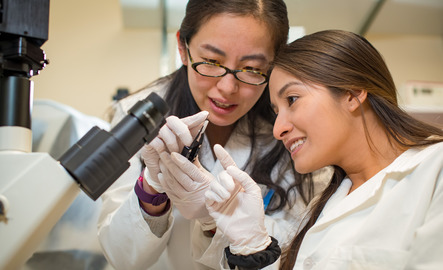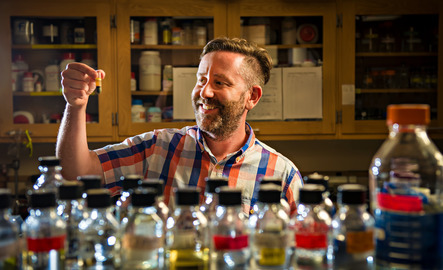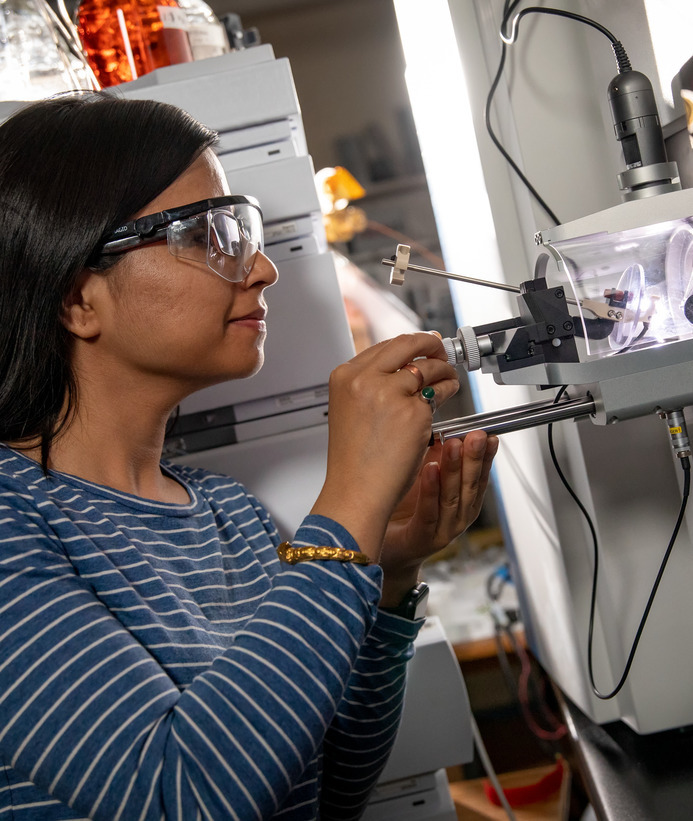About Molecular and Cellular Life Sciences at UW
We believe doctoral study of the life sciences shouldn't be constrained by the typical boundaries that define traditional scientific disciplines. Our interdisciplinary doctoral degree program in molecular and cellular life sciences has more than 30 faculty participants, distributed across campus among the College of Agriculture, Life Sciences and Natural Resources, College of Arts and Sciences, College of Engineering and Physical Sciences and College of Health Sciences.

Just as diverse as our faculty, graduate research subjects in molecular and cellular sciences include:
- Biotechnology, bioengineering and biomaterials
- Microbiology and infectious diseases
- Pharmacology
- Cell biology and signaling
- Genetics and development
- Genomics, proteomics and computational biology
- Structural biology and biophysics
- Bioinformatics

What Can You Do With a Molecular and Cellular Life Sciences Doctoral Degree?
The MCLS Ph.D. from the University of Wyoming prepares you for high-level careers in academia, government, independent research and industry. You will have the flexibility and research independence to customize UW’s MCLS program to fit your professional goals, opening a world of possibilities.
A Ph.D. in Molecular and Cellular Life Sciences prepares you for advanced careers in research, academia, biotechnology and healthcare. Graduates may become university professors, lead scientists in biotech or pharmaceutical companies, clinical researchers or experts in government labs and nonprofits. This degree also opens doors to roles in science communication, intellectual property and biotech entrepreneurship. With deep training in molecular and cellular processes, lab techniques and data analysis, you’ll be equipped to lead cutting-edge discoveries and innovations across a range of life science fields.
Molecular and cellular life sciences alumni have held titles such as:
- Postdoctoral Research Associate
- Senior Scientist
- Medical Writer
- Scientific Innovation Officer
- Senior Medical Science Liaison
- Senior Biosensor Scientist
- Medical Science Liaison
- Regional Medical Director
- Developer Relations Engineer
- Data Analyst
- Data Scientist
Our graduates have worked at or pursued post-doctoral fellowships at organizations and schools such as these:
- Vanderbilt University
- University of Washington
- National Institutes of Health
- Tufts University
- MD Anderson Cancer Center
- University of California, Berkeley
- University of California, San Diego
- USDA
- Kaggle
Wyoming’s vast and diverse natural landscape makes it an inspiring and dynamic place to study cellular life sciences. From high plains to alpine ecosystems, the state offers unique opportunities to connect molecular research with real-world environmental and biological systems. At the University of Wyoming, you’ll work closely with expert faculty on cutting-edge research that’s often rooted in the region’s natural surroundings—whether studying microbes in sagebrush soil or exploring cellular responses in extreme environments. With small class sizes, strong mentorship and easy access to the outdoors, Wyoming offers a one-of-a-kind setting to dive into science and launch a meaningful career.
From Microscopic Life to Medical Breakthroughs
Imagine being part of research that could revolutionize medicine. At UW, you'll work alongside faculty to study topics like tardigrades—microscopic animals that survive extreme conditions using unique proteins. This research explores how these proteins might one day preserve blood without refrigeration, protect organs for transplant or shield astronauts from the harsh environment of space. As a UW student, you won’t just study science—you’ll help shape the future of it.
"The MCLS program intends to bring the best out of every student. I was fortunate to train under a mentor and supervisor like Daniel Levy who went above and beyond to support me in my career aspirations which could be considered non-traditional according to academic beliefs. His lab was extremely productive which helped me generate multiple publications within a span of four and a half years. Professor Gatlin, the former MCLS program director and Karyn Bercheni, the former MOLB accountant, also supported me and helped me resolve payroll issues when I took a semester off of my final year of grad school to pursue an industry internship. Recently they have also integrated alternative career options after grad school as a mandatory curriculum which is very commendable."
- Dr. Richik Mukherjee, former MCLS student | Senior Medical Science Liaison in Oncology at Genentech


